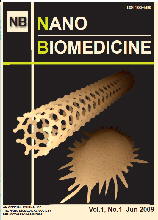
Nano Biomedicine
ORIGINAL ARTICLE
Controlled Calcification using Polyanionic Macromolecules with an Active Reaction Center Analogue of Carbonic Anhydrase
Shigeaki ABE1, Tomoki ISHIDA2, Emi YAMATOYA2, Daisuke HAYASHI3, Tsukasa AKASAKA1, Motohiro UO1, Fumio WATARI1, and Tomoya TAKADA3
1Department of Biomedical Materials and Engineering, Graduate School of Dental Medicine, Hokkaido University, Sapporo, Japan
2School of Dental Medicine, Hokkaido University, Sapporo, Japan
3Department of Material Chemistry, Asahikawa National College of Technology, Asahikawa, Japan